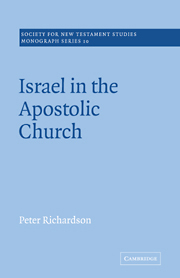Book contents
- Frontmatter
- Contents
- Preface
- Introduction
- Texts and Abbreviations
- I THE CHURCH AND ISRAEL
- II THE CHURCH FATHERS TO A.D. 160
- III POLITICAL FACTORS IN THE SEPARATION
- IV JESUS AND HIS DISCIPLES
- V PAUL
- VI POST-PAULINE DEVELOPMENTS
- VII CONCLUDING SUMMARY
- APPENDIXES
- A The ‘Apology’ of Aristides
- B Paul's use of λαός
- C The sects of Judaism and ‘ true Israel’
- INDEXES
B - Paul's use of λαός
Published online by Cambridge University Press: 05 March 2010
- Frontmatter
- Contents
- Preface
- Introduction
- Texts and Abbreviations
- I THE CHURCH AND ISRAEL
- II THE CHURCH FATHERS TO A.D. 160
- III POLITICAL FACTORS IN THE SEPARATION
- IV JESUS AND HIS DISCIPLES
- V PAUL
- VI POST-PAULINE DEVELOPMENTS
- VII CONCLUDING SUMMARY
- APPENDIXES
- A The ‘Apology’ of Aristides
- B Paul's use of λαός
- C The sects of Judaism and ‘ true Israel’
- INDEXES
Summary
In the New Testament laos is used with little unanimity: Luke/Acts prefers the word, John often replaces it with either a more general or a more particular word, Hebrews tends to use it in Old Testament allusions of the people as opposed to the priests, Paul uses it only in recognizable quotations from the Old Testament. For Paul's use we have no control passage where the word is not prejudiced by Old Testament connections. Absence of the word in Pauline composition raises the question of the significance laos had for Paul, and whether there is some reason for his holding back from using it independently.
Eleven of the twelve instances in the Pauline literature fall in the major letters: six times in Romans 9-11, twice in Romans 15, twice in 1 Corinthians, once in 2 Corinthians and once in Titus. In at least nine of these instances the context includes references to Gentiles and Jews. Generally we should expect laos to be taken over by the Church to apply to itself as the special people of God. That this happened is beyond doubt, but the point we want to raise is whether it had happened already in Paul's writings.
In Romans 10: 21; 11: 1 f., there are three instances of laos. In Romans 10: 20 f. Paul uses Isaiah 65: 1 f., a text referring to the Northern Kingdom in which ethne and laos stand in synthetic parallelism, to apply to two different groups. The ‘ones who do not seek’ of Romans 10: 20 are likened to ‘those not a nation’ (‘unwise nation’) of v. 19, and these are contrasted to Israel in the introduction of v. 21.
- Type
- Chapter
- Information
- Israel in the Apostolic Church , pp. 211 - 216Publisher: Cambridge University PressPrint publication year: 1969

